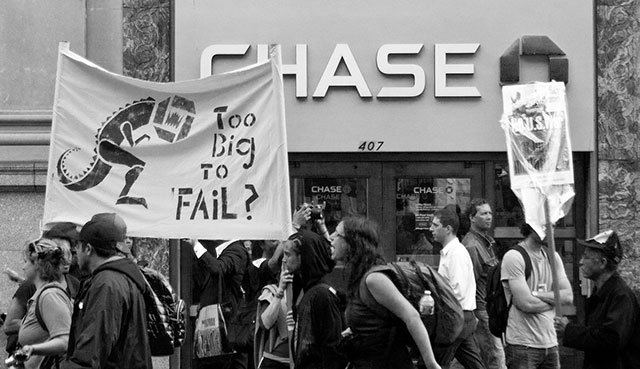
Federal regulators announced Wednesday morning that Dodd-Frank-mandated resolution plans of five “too big to fail” banks were “not credible,” setting in motion a process that could see them broken up in thirty months.
The Federal Deposit Insurance Corporation (FDIC) and Federal Reserve on Wednesday announced that plans outlined by the quintet — Bank of America, JP Morgan Chase, Wells Fargo, New York Mellon, and State Street — were inadequate.
Because of the joint ruling, the firms are under pressure to revise their so-called “living wills.” The FDIC and Fed may subject the five banks to more strict regulations and reserve requirements on Oct. 1, if they fail to submit a satisfactory scheme by then. And if they haven’t submitted proper living wills by October 2018, the two agencies “may jointly require the firm to divest certain assets or operations to facilitate an orderly resolution of the firm in bankruptcy,” as the Fed noted on Wednesday.
Three other Wall Street behemoths escaped a similarly bleak scenario for their shareholders. The Fed and FDIC said they disagreed about the credibility of the “living wills” hashed out by Goldman Sachs and Morgan Stanley — only the FDIC deemed Goldman’s plan “not credible,” while the Fed shot down Morgan Stanley’s proposal. Citigroup, meanwhile, had its plans almost approved, though both agencies “did identify shortcomings that the firm must address.”
In February, Sen. Elizabeth Warren (D-Mass.) explained the significance of joint Fed-FDIC “not credible” determinations on living wills, when asking Fed Chair Janet Yellen about previous rulings made in 2014.
“The Fed’s refusal to call the plans ‘not credible’ meant the agencies couldn’t use statutory rules to push these risky banks in the right direction,” Warren said in a Senate Banking Committee hearing.
When Dodd-Frank financial reform was passed in 2010, Congress created an inter-agency body called the Federal Stability Oversight Council (FSOC) and gave it the power to declare certain banks, investment firms and insurance companies “SIFI” — systemically-important financial institutions.
The law concurrently forced outfits slapped with the SIFI-label to formulate living wills; to minimize the possibility of 2008-style market failure and publicly-funded bailouts, in the event of financial instability.
“Each plan … must describe the company’s strategy for rapid and orderly resolution under bankruptcy in the event of material financial distress or failure of the company,” the Fed noted Wednesday.
The eight banks whose living wills were assessed on Monday are the only SIFIs based in the United States. The Fed and FDIC are still assessing plans being written by four foreign SIFIs: Barclays PLC, Credit Suisse Group, Deutsche Bank AG, and UBS.
Angry, shocked, overwhelmed? Take action: Support independent media.
We’ve borne witness to a chaotic first few months in Trump’s presidency.
Over the last months, each executive order has delivered shock and bewilderment — a core part of a strategy to make the right-wing turn feel inevitable and overwhelming. But, as organizer Sandra Avalos implored us to remember in Truthout last November, “Together, we are more powerful than Trump.”
Indeed, the Trump administration is pushing through executive orders, but — as we’ve reported at Truthout — many are in legal limbo and face court challenges from unions and civil rights groups. Efforts to quash anti-racist teaching and DEI programs are stalled by education faculty, staff, and students refusing to comply. And communities across the country are coming together to raise the alarm on ICE raids, inform neighbors of their civil rights, and protect each other in moving shows of solidarity.
It will be a long fight ahead. And as nonprofit movement media, Truthout plans to be there documenting and uplifting resistance.
As we undertake this life-sustaining work, we appeal for your support. Please, if you find value in what we do, join our community of sustainers by making a monthly or one-time gift.